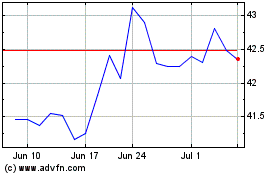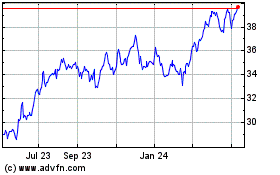Williams Cos. Fights to Save Deal
June 26 2016 - 8:40PM
Dow Jones News
Williams Cos. faces an uncertain future as its shareholders meet
on Monday to vote on a merger with pipeline rival Energy Transfer
Equity LP that may already be dead in the water.
The company is still recommending that its investors vote in
favor of the takeover by Energy Transfer, even though a Delaware
judge ruled Friday that Energy Transfer can get out of the deal
after its lawyers said they had discovered negative tax
consequences.
Williams has spent months arguing publicly that investors would
be better off going through with the deal, even as Energy Transfer
did everything it could to get out, and relations between the
companies turned rancorous.
The legal fight will likely continue. Williams has said it is
committed to closing the deal, and is considering appealing the
ruling, a person familiar with the matter said. If Williams loses
that appeal, it could sue Energy Transfer for damages.
Both companies declined to comment.
Kelcy Warren, Energy Transfer's billionaire chief executive,
spent months pursuing Williams, ultimately striking a deal in
September that was worth $33 billion at the time. But as oil prices
continued to slide, Mr. Warren began to fear that the $6 billion in
cash Energy Transfer had agreed to pay would drag his pipeline
empire down.
When Energy Transfer said its lawyers had found a potential tax
pitfall and wouldn't be able to deliver a crucial opinion needed
for the deal to close, Williams accused its acquirer of looking for
an escape hatch. It sued to force Energy Transfer to go through
with the merger, but Vice Chancellor Sam Glasscock III of the
Delaware Court of Chancery sided with Energy Transfer on Friday,
finding that its lawyers were acting in good faith when they found
the issue.
Even at the height of the acrimony between the two companies,
some analysts and investors still believed the Energy Transfer deal
was worth doing.
"The same sector headwinds which make the combination now seem
so challenging to the Energy Transfer CEO are headwinds Williams
would continue to face on a standalone basis, but forever cutoff
from the strategic opportunities a combined company could obtain,"
the proxy advisory firm Institutional Shareholder Services Inc.
wrote in a June 15 report.
Williams has warned investors that it would likely have to cut
or even eliminate its dividend if the deal doesn't go through, and
has said that becoming part of Energy Transfer would put the
company on firmer footing.
But the outlook for Williams isn't as cloudy as it was just a
few months ago. Rising natural-gas prices have helped assuage fears
about Chesapeake Energy Corp., which accounted for 18% of
Williams's revenue last year.
And Williams still has the assets that made it so appealing to
Energy Transfer in the first place: a vast network of pipes in the
Marcellus shale formation in the Northeast, and the 10,000 mile
Transco pipeline, which carries natural gas from Texas to New York
City.
"Williams should be just fine," said Brandon Blossman, an
analyst at Tudor, Pickering Holt & Co.
Some analysts and investors say a canceled deal would be the
best outcome. Williams could revisit a plan to buy its partnership,
Williams Partners, which was in the works last year when Energy
Transfer swooped in. It could also entertain offers from another
buyer, or focus on its own operations.
"Both of these enterprises are better off alone than they would
have been if saddled with even more collective debt," Robert W.
Baird analyst Ethan Bellamy said.
Whatever it does next, Williams will have to contend with sharp
divisions among its leaders—fractures that were laid bare in court
testimony and depositions. Williams's board includes two activists
who were appointed in 2014, after taking a stake in the company and
pushing for changes in strategy. Those directors, Keith Meister,
managing partner of Corvex Management LP, and Eric Mandelblatt,
managing partner of Soroban Capital Partners, were among those
pushing for the Energy Transfer deal, while Chief Executive Alan
Armstrong opposed it.
Both Williams and Energy Transfer will have to rebuild investor
confidence should the deal fail, analysts said.
"Nobody comes off great in terms of the players in the drama,"
said Hinds Howard, a portfolio manager at CBRE Clarion Securities.
"From a reputational standpoint, I think there are a lot of
losers."
Liz Hoffman contributed to this article.
Write to Alison Sider at alison.sider@wsj.com
(END) Dow Jones Newswires
June 26, 2016 20:25 ET (00:25 GMT)
Copyright (c) 2016 Dow Jones & Company, Inc.
Williams Companies (NYSE:WMB)
Historical Stock Chart
From Mar 2024 to Apr 2024

Williams Companies (NYSE:WMB)
Historical Stock Chart
From Apr 2023 to Apr 2024
